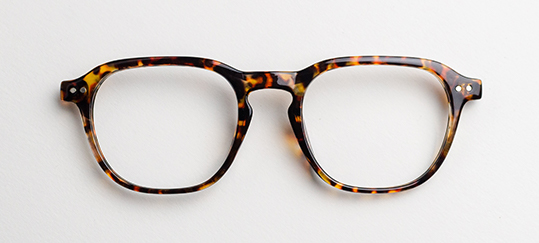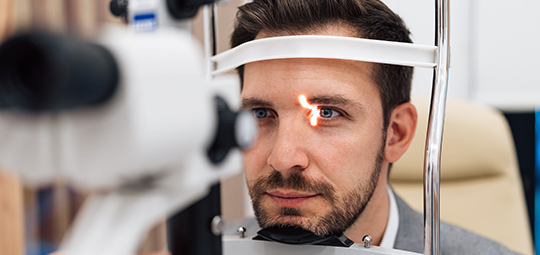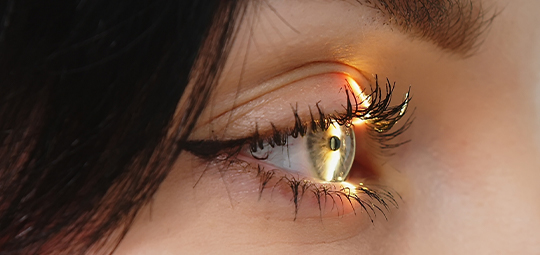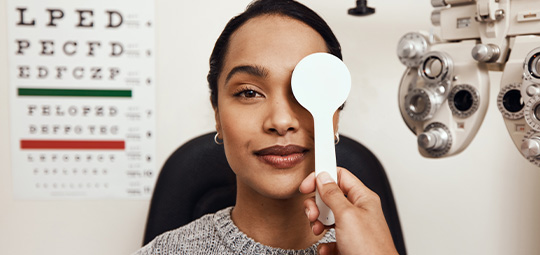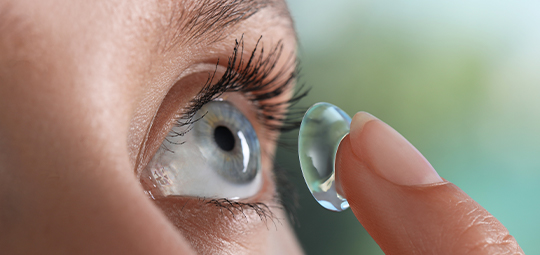Medical Eye Care for Eye Disease Detection & Management
As we age, we become more susceptible to eye conditions and diseases. Your comprehensive eye exam from The Eye Group Associates is the first step to catching the earliest signs of eye disease, which can develop without any symptoms noticeable to you.
We are your eye care team when you need medical eye care, surgical co-management, or post-operative eye care support. Our skilled eye care team has years of experience diagnosing and managing eye diseases and working with patients with high prescriptions. We also have a network of trusted eye surgeons to connect you with for procedures that cannot be done in our offices.
We provide consultations and care for:
- Glaucoma
- Diabetic eye disease
- Macular degeneration (AMD)
- Cataract surgery
- Dry eye disease
- Binocular vision dysfunction (eye misalignment that can cause migraines and vision issues)
Request an appointment today. We’re here to guide you through any changes to your vision with care and respect.
Request AppointmentCaring, Compassionate, Complete Medical Eye Care
If you have concerns about vision loss, changes to your vision, or having a higher risk of developing certain eye diseases or conditions, we will schedule you for a comprehensive appointment to understand both your vision and overall health.
When you book your appointment, we’ll let you know whether you should expect to have your eyes dilated. Dilating your eyes allows us a richer picture of the structures in your eyes and helps us diagnose conditions.
Glaucoma
Glaucoma is a condition that damages the optic nerve, often due to increased pressure in the eye. This can lead to gradual vision loss, especially peripheral vision.
In the early stages of glaucoma, you won’t notice any vision changes, which is why a regular eye exam is so important. At later stages, glaucoma can cause low vision and eventually blindness.
The good news is that glaucoma can be managed when it’s detected early. With treatment, most people with glaucoma do not lose their vision.
Glaucoma is treated both medically (with eye drops or pills) and surgically (laser surgery and filtering surgery). Our optometrists will recommend the best treatment plan for you and work with you over time to make adjustments as needed.
Macular Degeneration (AMD)
Macular degeneration (also called AMD or age-related macular degeneration) affects the central part of the retina, eventually causing blurred vision and difficulty seeing fine details at the center of your vision. It’s a common cause of vision loss in older adults. Like many eye diseases, early AMD doesn’t show noticeable symptoms, so an eye exam is important.
There are 2 types of macular degeneration: dry and wet.
Dry macular degeneration is the most common and typically progresses slowly over many years.
Wet macular degeneration, though much less common, progresses very quickly when abnormal blood vessels grow in the back of the eye and damage the macula.
There is currently no treatment for dry AMD, but specialized vitamins may be effective for some patients. Wet AMD can be treated with injections and laser therapy.
Cataract Consultations
Cataracts are actually considered an eye condition, not a disease, as they are cloudy areas that naturally form in the lens of the eye as we age. Over time, cataracts can interfere with vision, making it difficult to see clearly.
The great news is that cataract surgery is highly routine and successful for people with cataracts to regain their vision.
If you think you may have cataracts, our appointment desk will schedule you for a complete dilated eye examination. As there can be many causes for vision loss besides cataracts, your examination will be quite thorough.
Cataracts Symptoms
Symptoms of cataracts include:
- Difficulty reading fine print, seeing road signs while driving, or trouble seeing the TV
- Challenges with night driving due to glare
- Cloudy vision
- Faded colors
Your Cataracts Exam
Your exam for cataracts is comprehensive and includes the following:
- Measuring your prescription: An updated prescription can improve your vision and delay your need for surgery.
- Dilation: With your pupil dilated, the lens can be seen in its entirety. Your optometrist will judge the degree of clouding of the lens and whether it would help to replace it with an intraocular lens implant.
- In-depth exam: Your doctor will examine your eyes inside and out to determine if any other eye diseases or conditions are present.
- Treatment options: We’ll discuss the options together, which can include planning for surgery or making adjustments to lighting and your glasses to avoid surgery as long as possible.
Cataract Surgery
Once the decision to proceed with cataract surgery is made, we’ll discuss which intraocular lens implant best fits your needs.
Remember that a cataract is a clouding of the natural lens, and surgery involves removing it.
With an intraocular lens implant, a new lens implant is placed in the eye where the cataract was.
These intraocular lens implants (IOLs) come in various powers and styles. With IOLs, we can correct astigmatism, presbyopia (the need for reading glasses), nearsightedness, and farsightedness.
This means you might reduce or even eliminate the need to use glasses after your cataract surgery!
We can recommend one of our preferred local surgeons for your cataract surgery. We’ll be with you every step of the way before and after your procedure.
Diabetic Eye Disease
For people with diabetes, having a comprehensive eye exam every year is critical. Diabetes can damage the blood vessels in the retina, leading to diabetic retinopathy. This condition can cause vision loss and even blindness if left untreated, and it’s the leading cause of blindness among working-age Americans.
The best way to prevent vision loss related to diabetes is to keep your blood sugar controlled and develop healthy habits.
Learn more about diabetic eye exams and diabetic eye conditions.
Dry Eye Disease
Dry eye disease occurs when the eyes don’t produce enough tears or the tears evaporate too quickly. This can cause dry, irritated, and blurry vision. Usually, it will not threaten your vision, but it can be uncomfortable and lower your quality of life. However, dry eye can also be a sign of other health or eye issues.
Dry eye can be caused by various underlying factors, and while there’s no cure yet, there’s a lot we can do to soothe its symptoms.
Our dry eye treatments include:
- Appropriate artificial tear use
- Punctal plugs
- Diagnosing issues with your eyelid margins, such as meibomian gland dysfunction or blepharitis
- Prescription drops or ointments to fight inflammation
Eye Misalignment (Binocular Vision Dysfunction)
Binocular vision dysfunction (BVD) is an eye condition caused by subtle misalignments in how your eyes work together. Though these misalignments may seem minor, they can lead to various symptoms that can significantly impact your daily life.
Common symptoms of BVD include:
- Wye strain
- Headaches
- Difficulty focusing
- Neck and shoulder pain
- And more
While these symptoms can be distressing, it’s important to know that BVD is treatable.
Leveraging Technology for Your Eye Health
The devices we use during your eye exam allow us to gain a detailed picture of your eye and vision health.
We use various imaging techniques to see the inner structures of your eyes in detail. Our optometrists have years of experience interpreting the results of these images to understand what each nuance means for your eyes’ health.
For those with eye disease, we’ll do imaging regularly to monitor any changes. For those with healthy eyes, we may use certain devices to gain a baseline of your eyes to catch any changes as soon as we notice them.
Optical Coherence Tomography (OCT)
OCT uses light waves to capture a cross-section view of the layers of the retina at the back of your eye.
We can use OCT to detect and monitor AMD, diabetic retinopathy, and glaucoma.
Heidelberg Retinal Tomograph (HRT)
In just a few minutes, this device captures high-resolution, 3D images of your optic nerve and retina.
We can use HRT imaging to diagnose and monitor glaucoma, macular degeneration, and other retinal conditions.
Fundus Photography
The fundus is the back part of the eye and contains structures essential to vision, including the retina and macula.
We use fundus photography to capture images of these structures so we can detect any changes and catch or monitor eye diseases.
Compassionate Care for Your Eyes
We understand that experiencing unexpected changes to your vision can be stressful. Our team is here to support you throughout the journey.
Request your appointment today.
Request AppointmentOur Location
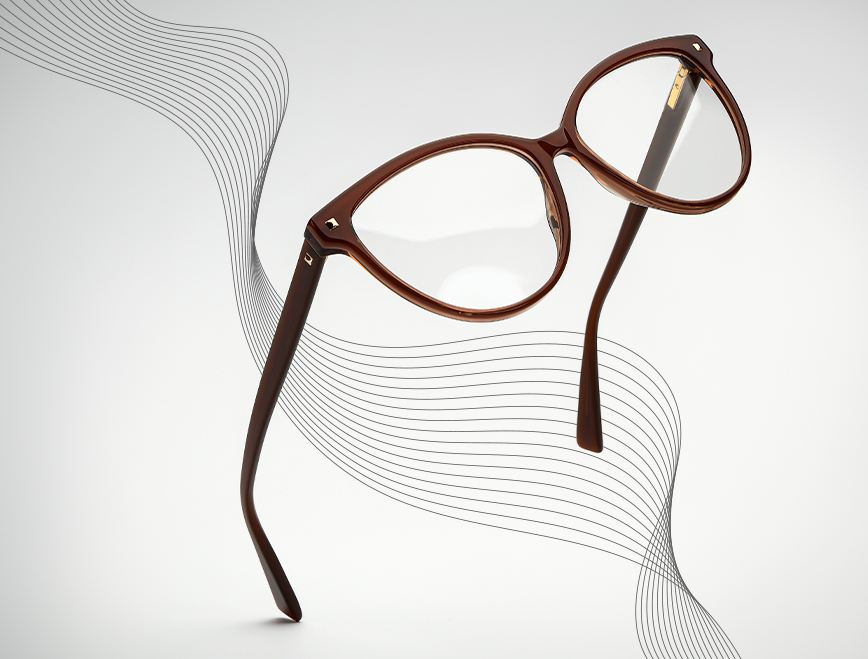
Our Address
- 200 SW Market Street, Suite L120
- Portland, OR 97201
Validated parking with valet service available.
Contact Us
- Phone: 503-223-8147
- Fax: 503-226-2370
- Email: [email protected]
Clinic Hours
- Monday: 8:00 AM – 5:00 PM
- Tuesday: 8:00 AM – 5:00 PM
- Wednesday: 8:00 AM – 5:00 PM
- Thursday: 8:00 AM – 5:00 PM
- Friday: 8:00 AM – 5:00 PM
- Saturday: Closed
- Sunday: Closed

Our Brands

